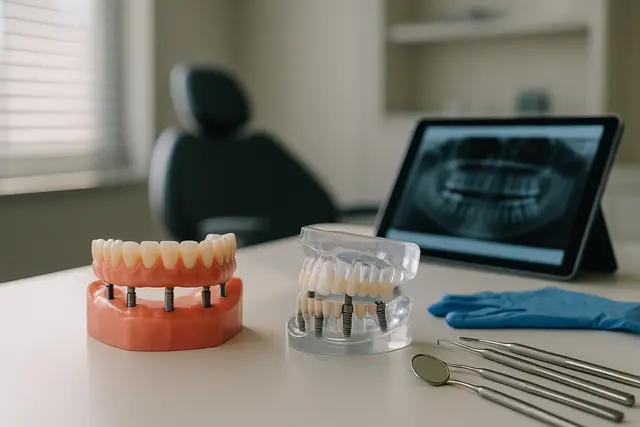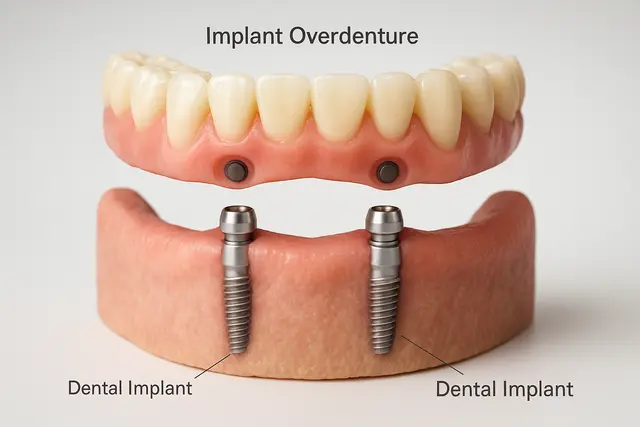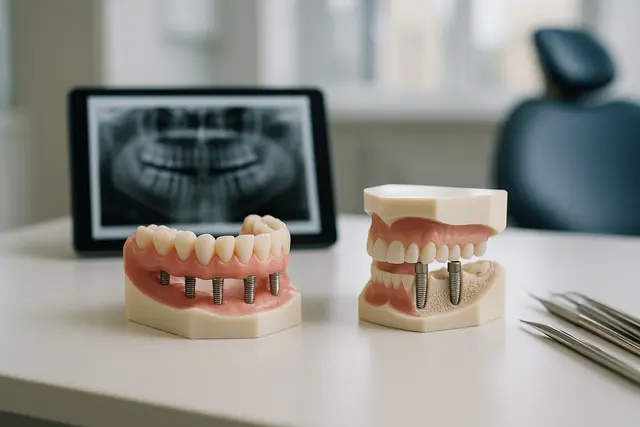Prosthodontics
4 min read
Aug 12, 2025
Can You Chew Food With Dentures? Practical Tips for Everyday Meals
Adjusting to life with dentures can feel like a big change, especially when it comes to eating your favorite foods. While chewing with dentures takes some practice, the right techniques and habits can make the process comfortable and stress-free from the start.

Chewing food with dentures can feel weird at first. If you just got a new denture, you might be wondering if you’ll ever be able to eat normally again. Good news? You absolutely can. Not-so-great news? It might take some getting used to. But with the right approach (and maybe a few soft foods to start), you’ll be able to eat almost anything with confidence.
Here are practical, no-nonsense tips for eating with dentures that’ll help you chew like a champ and enjoy your favorite foods again.
Getting Dentures Doesn’t Mean Giving Up the Foods You Love
So, you’re wearing dentures for the first time. First of all, welcome. Dentures offer a fantastic solution if you’ve been dealing with missing teeth or sore gums. Whether you’re rocking a full set of teeth or partials, the adjustment period is totally normal.
Eating with new dentures can take a little patience, especially when it comes to tough foods or chewy favorites. You’ll need time to get used to the dentures in your mouth, how they feel, and how they respond when you bite down. But don’t worry. Most denture wearers figure things out quickly with a few tweaks and some smart choices.
Start Slowly With Soft Foods While You Adjust
This isn’t the time to dive into steak night. Soft foods are your best friend while you get used to your dentures. Think mashed potatoes, scrambled eggs, yogurt, or soups that don’t fight back. These are easy to chew and gentle on your gums.
Eating soft foods gives your mouth time to heal if you’ve had dental work or experienced soreness. And yes, it really does take a few days to get used to chewing again. Don’t rush it. Your gums will thank you.
Use Denture Adhesive for Extra Confidence
There’s no shame in needing a little backup. Denture adhesive can help your denture stay in place, which means less slipping, more chewing, and way fewer awkward moments mid-meal. If you feel like your denture could use more stability, a good adhesive makes all the difference.
It also helps reduce irritation and keeps pressure on your gums more evenly distributed. If your denture feels loose or you’re nervous about your upper denture moving around, give adhesive a shot.
Avoid Sticky Foods Until You’re Fully Adjusted
Chewy foods like caramels, tough breads, or gooey candies can dislodge your denture or even damage it. Until you’re fully adjusted, avoid eating foods that tend to stick, pull, or cling. That includes sticky foods and even some raw veggies like celery or corn on the cob.
These types of foods can cause soreness, mess with your bite, and even loosen your dentures if you're not careful. Don’t worry, you’ll be able to eat these again later. For now, play it safe.
Chew Evenly on Both Sides of Your Mouth
One of the smartest tips for eating with dentures is to chew evenly. Try to distribute food on both sides of your mouth so you're not putting all the pressure on one area. This keeps your denture more balanced and reduces the chance of tipping or slipping.
You’ll get the hang of eating with dentures faster this way. Plus, chewing evenly can help protect your gums from too much pressure on one side and reduce your risk of gum irritation.
Cut Your Food Into Small Pieces to Make Things Easier
This isn’t the time for giant bites. Cut your food into small, manageable pieces to make chewing easier and prevent your denture from shifting. Smaller bites mean less pressure on your dentures and your gums.
You can still enjoy solid food, just in a more denture-friendly way. And as a bonus, cutting food this way makes it easier to judge the temperature so you don’t burn your mouth.
Tips for Eating With Dentures That Actually Work
Here are simple tips that actually make a difference for people eating food with dentures:
Avoid spicy or extremely hot foods in the beginning. They can irritate your gums.
Rinse your mouth after meals to keep things fresh and help clean your dentures on the go.
Make sure to clean your dentures every day to prevent buildup and keep them comfortable.
Chew on one side if you're struggling, then slowly work your way up to both sides.
Stay hydrated. It helps with saliva production, which keeps your denture from drying out or sticking.
Start Slowly and Build Up to Tougher Foods
When you’re trying to adjust to dentures, patience is your best tool. Don’t jump into tough foods like nuts, crusty bread, or chewy meats right away. These can increase the pressure on your dentures and your gums, causing soreness or irritation.
Instead, build your confidence with softer meals and slowly introduce more solid foods over time. Eventually, eating anything won’t feel like a big deal. You’ll be able to chew, speak clearly, and enjoy your meals like natural teeth are doing all the work.
Restorative Dentistry and Alternatives Like Dental Implants
Not everyone loves traditional dentures. If you’re struggling to get used to them, talk to your dentist. Restorative dentistry has come a long way. Options like dental implants can give you a more stable, long-term fit that feels a lot more like natural teeth.
Implants can reduce the risk of gum issues, offer stronger bite force, and take away some of the frustrations that come with wearing dentures. Ask your dental associates if that’s something worth considering.
Can You Eat Normally With Dentures?
Yes, you can eat normally with dentures once you’ve gone through the adjustment period. At first, dentures may feel bulky, and chewing can be awkward. The best approach is to start slowly with soft foods and gradually reintroduce more challenging items as your comfort increases. Over time, you’ll adapt to chewing with dentures and be able to enjoy a wide variety of meals without difficulty.
What Are the Best Foods to Start With When Adjusting to Dentures?
Soft foods are the ideal starting point for new denture wearers because they are gentle on the gums and easy to chew. Options like mashed potatoes, scrambled eggs, yogurt, soups, and smoothies allow you to practice chewing evenly without putting too much pressure on your dentures. As you gain confidence, you can slowly add firmer foods in small, manageable pieces.
How Can I Keep My Dentures Secure While Eating?
Using a quality denture adhesive can help keep your dentures stable during meals. Applying the right amount, as recommended by your dentist, adds extra security, reduces gum irritation, and makes chewing more comfortable. Additionally, chewing food evenly on both sides of your mouth helps maintain balance and prevents dentures from shifting out of place.
Which Foods Should I Avoid With Dentures?
In the early stages, it’s best to avoid sticky foods like caramel, taffy, and certain chewy candies, as they can pull dentures loose and leave residue. Tough foods such as steak, crusty bread, and raw carrots should also be postponed until you’re fully adjusted. Limiting very spicy or overly hot foods at first can help prevent irritation or accidental burns while your gums are still sensitive.
Read Next
Related Posts

Prosthodontics
Implant Supported Dentures Overview
Missing teeth can impact more than just your smile, they can affect your confidence, comfort, and even your diet. Fortunately, modern dentistry offers a solution that’s both secure and natural-looking: implant-supported dentures. This innovative approach blends the stability of implants with the convenience of dentures to create a long-lasting, life-improving upgrade.
5 min read
Oct 29, 2025

Prosthodontics
Implant Overdentures Explained: The Hybrid Solution to Missing Teeth
Missing teeth can impact everything from your ability to eat to your self-confidence. While traditional dentures have long been a go-to solution, they often fall short in comfort and stability. Implant overdentures offer a modern alternative that combines the security of dental implants with the convenience of removable dentures, a true upgrade for those looking to reclaim their smile.
6 min read
Oct 29, 2025

Prosthodontics
Implant Retained Dentures Explained
Considering implant-retained dentures? You're not alone. As modern dentistry evolves, more people are turning to this secure, natural-feeling alternative to traditional dentures. This guide will walk you through what they are, how they work, and why they might be the solution you've been looking for.
4 min read
Oct 28, 2025
Don’t have time to research every dentist around you?
See why 30k+ patients trusted us